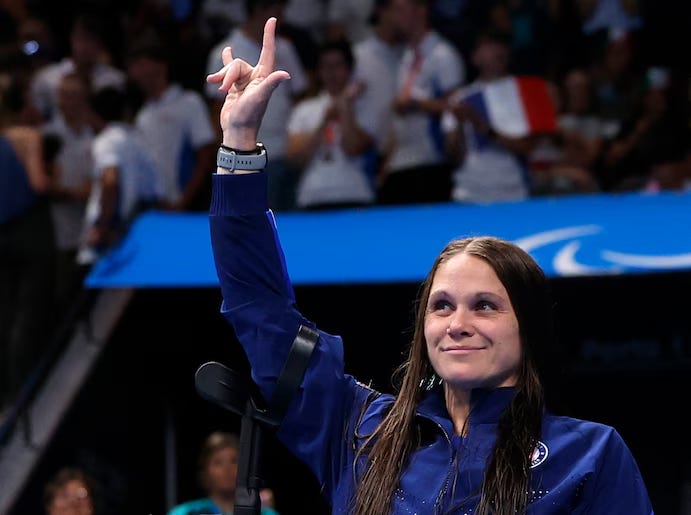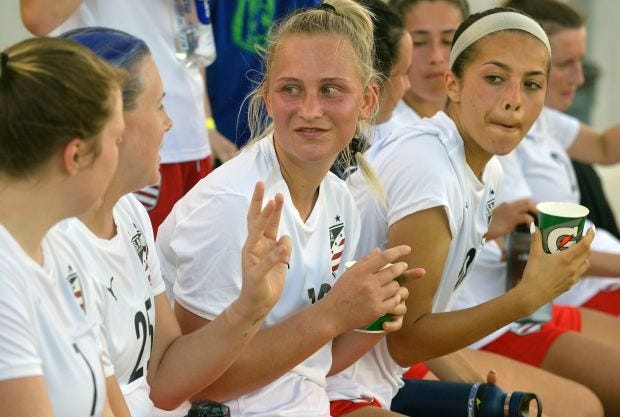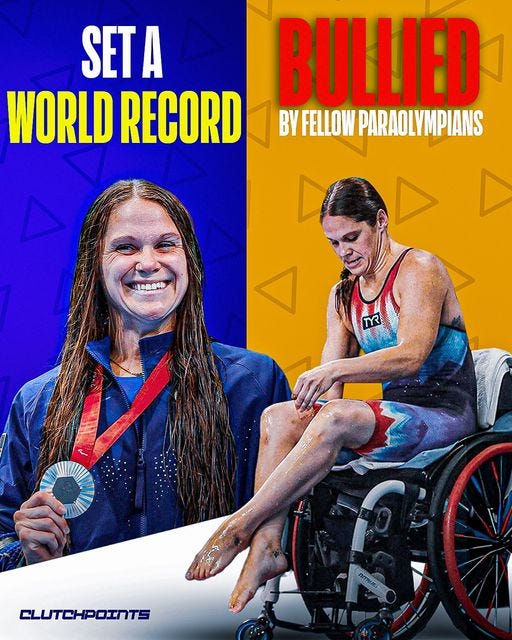Last night, Google News published SwimSwam's article, “US Paralympic Adminstrators Admonish Team Over Social Media Behavior At Paralympic Games.”
Suddenly, I remember one Facebook page mentioning “bullied” a few days ago.
Below is the Facebook Page of ClutchPoints (a sports media website) on September 4.
This is the BIGGEST controversy at the Paralympics.
A US swimmer is getting bullied after she set a world record. But she's getting bullied by her OWN fellow Paralympians.
Christie Raleigh Crossley is a 37-year-old single mom from New Jersey.
And in her 50m freestyle heat at the 2024 Paris Paralympics, she set a world record. And later went on to win silver.
But instead of celebrating, she had to deal with online harassment.
Why?
First, we need to understand Crossley’s story.
She’d been training for the Olympics since she was a teenager. The 2008 Beijing Games were a real possibility.
But in 2007, a drunk driver derailed those hopes.
After recovering from injuries, getting married, and having kids, she set her sights on the 2021 Tokyo Olympics.
But fate intervened again.
Her son accidentally threw a ball of ice right at the back of the head. The doctors then revealed a blood tumor in her brain that they needed to remove. And Crossley was paralyzed on her left side.
In 2022, she officially became a Para swimmer.
But here’s the controversy:
In Para Swimming, athletes get split up and compete against other athletes with a similar disability. But sometimes the lines get blurred.
And Paralympians are often accused of exaggerating their disability to sneak into a certain classification - to compete against those more severe disabilities.
Crossley was classified as an S9 swimmer. And many Paralympians felt she should be competing in a different category.
USA Paralympic swimmer Jessica Long and Spanish Paralympic swimmer Sarai Gascón Moreno both went to social media to criticize Crossley after her world record and silver medal.
Even calling it “a joke.”
Because moving up or down a class could be the difference between setting a world record and not winning anything at all.
Crossley, meanwhile, has said she hopes to be a symbol for athletes everywhere whose disability doesn’t look like others.
On August 29, the Washington Post ran “U.S. Paralympic swimmer faces online bullying after setting record” (Subscribed?)
One week earlier, on August 22, the New York Times published an excellent article about Crossley - “The Trials of a Paralympian Whose Disability Doesn’t Always Show.” (Subscribed?)
Read what Director of U.S. Paralympic Swimming Erin Popovich wrote in his email to other swimming Paralympians:
Dear Team USA Paralympic Swim Team,
I want to express my deep disappointment regarding the recent conduct observed on social media, which blatantly disregards the message we previously communicated and the Team USA delegation terms. Engaging in public disputes and targeting teammates on platforms like Instagram is unacceptable and contrary to the values we uphold.
We want to remind everyone that there are established and proper channels available for voicing any concerns or complaints. We encourage you to use these avenues to ensure that all matters are addressed appropriately and respectfully.
For those involved, please be informed that your actions have been reported to the governing board, and you will be placed on notice. A disciplinary decision will follow shortly. This behavior is not in line with the standards expected of Team USA representatives and will not be tolerated.
As we approach the conclusion of these Games, we urge each of you to reflect on your responsibilities as members of this esteemed team. Represent the United States with dignity and respect, and be the supportive teammates we know you can be.
We appreciate your attention to this matter and trust that you will conduct yourselves appropriately moving forward.
My opinion about Christie Raleigh Crossley? She is crystal-clearly disabled-!
Well, like the regular Olympics have been plagued by doping scandals, the Paralympics have been hammered by charges of athletes gaming the classification system.
Read the 2017 article, “Taped limbs, Valium and cold showers: Paralympic cheating claims mount.”
And the recent Washington Post article, “As Paralympics get bigger, some athletes say cheating is more prevalent” (Subscribed?)
So, rearranging the classification is an ongoing problem of the International Paralympic Committee.

Bulling at the Deaflympics?
Oh, boy! I have attended 13 of the last 14 Deaflympics since 1969, and I don’t recall any significant bullying incidents in the Deaflympics.
However, I noticed that deaf athletes of the weak third nation teams were overcontrolled by their non-deaf leaders/coaches.
USA Teams?
That is okay, but there is a communication problem between sign and non-sign language users.
For example, in my first Deaflympics in 1969, I was one of four among 123 athletes who did not use sign language.
At the last Deaflympics in 2022, most of the 137 USA athletes did not know how to use sign language.
How came?
Before the 1981 eligibility rule, an athlete who had attended any institution for the deaf or had permission from a physician was eligible to participate. (In my case, I attended the Nan Kennedy School for Oral Deaf in Dayton, Ohio.)
Effective in the 1981 World Games for the Deaf (renamed Deaflympics in 2001), the rules state:
Deaf is defined as a hearing loss of at least 55 dB in the better ear (3-tone frequency average of 500, 1,000, and 2,000 Hertz, ANSI 1969 standard).
Not using hearing aids or external cochlear implant aids during any Deaflympics event.
Today, more Deaflympains are wearing cochlear implants or more robust hearing aids.
Interesting Note: Besides the drug test after winning the top three places after the event, the top three deaf finishers must take a hearing test.
What is wrong with the United States Olympic and Paralympic Committee?
I am totally sorry for Christie Raleigh Crossley and any disabled athletes having a similar experience with Crossley. The Washington Post article states:
“We take all matters of bullying, harassment, and abuse with the utmost seriousness,” Kate Hartman, a spokesperson for the United States Olympic and Paralympic Committee, said in a statement. “Every athlete deserves to be treated with respect and dignity, and we are committed to fostering an atmosphere that not only encourages excellence in competition but also prioritizes mental and emotional well-being.”
In 2018, Michael “Mike” Harrigan, the former Executive Director of the President's Commission on Olympic Sports (1975-77), pointed out that the underlying causes of what went wrong were:
The USOC failed to properly oversee national governing bodies as the Amateur Sports Act of 1978 (ASA) required.
The USOC failed to understand certain portions of the ASA.
The USOC failed to educate its members and Congress on its contents.
The USOC's "culture" had ignored everything in its legislative mandate except the goal of winning Olympic medals.
Five years later, on September 6, 2023, Ed Williams, a past Chair of the USOPC Athletes’ Advisory Council (1977-81), testified before the Commission of the State of U.S. Olympics and Paralympics (CSUSOP) and said, “The USOC leadership, both staff and the board, must engage in a program of self-education. Just ask Mike Harrigan about that. Many good things and lessons learned in the past have been lost and forgotten on account of the lack of any institutional memory within the USOC.”
I must conclude this commentary with one question for our Congress:
In the 277-page Final Report, the Commission on the State of U.S. Olympics and Paralympics has recommended to Congress the following:
Congress should also study further the challenges faced by deaf and hard-of-hearing athletes and proposals to integrate deaf sports into the U.S. Olympic and Paralympic movement; in the meantime, USOPC should work with the U.S.A. Deaf Sports Federation (USADSF) to remove impediments to its full use of Deaflympic trademarks and access to sponsorships.
There has yet to be a congressional action on this recommendation as of this writing.
Several former Deaflympians told me that we feel that the USOPC has bullied us since the enactment of the Ted Stevens Olympic and Amateur Sports Act of 1998-!!! (NOTE: we had enjoyed the treatments from the USOC during the ASA period (1978-1998))

Howard “Howie” Gorrell attended 13 of the last 14 Deaflympics since 1969 and is a 2004 recipient of the USADSF Jerald M.Jordan Award, given to those who exhibit leadership and continuous participation toward the goals of the Deaflympics and the 2011 Art Kruger Award for demonstrating leadership and constant participation,support and contribution in the USADSF over an extended period.



